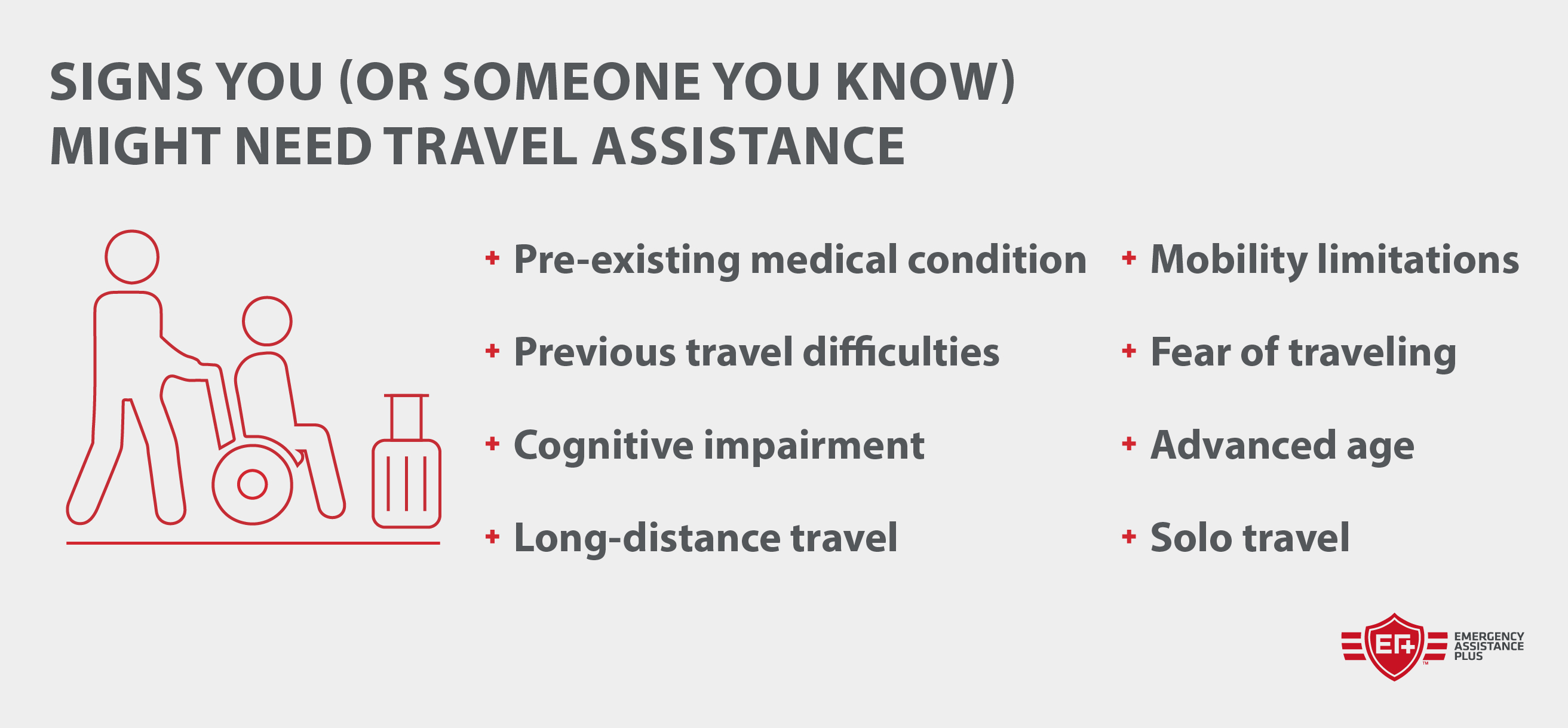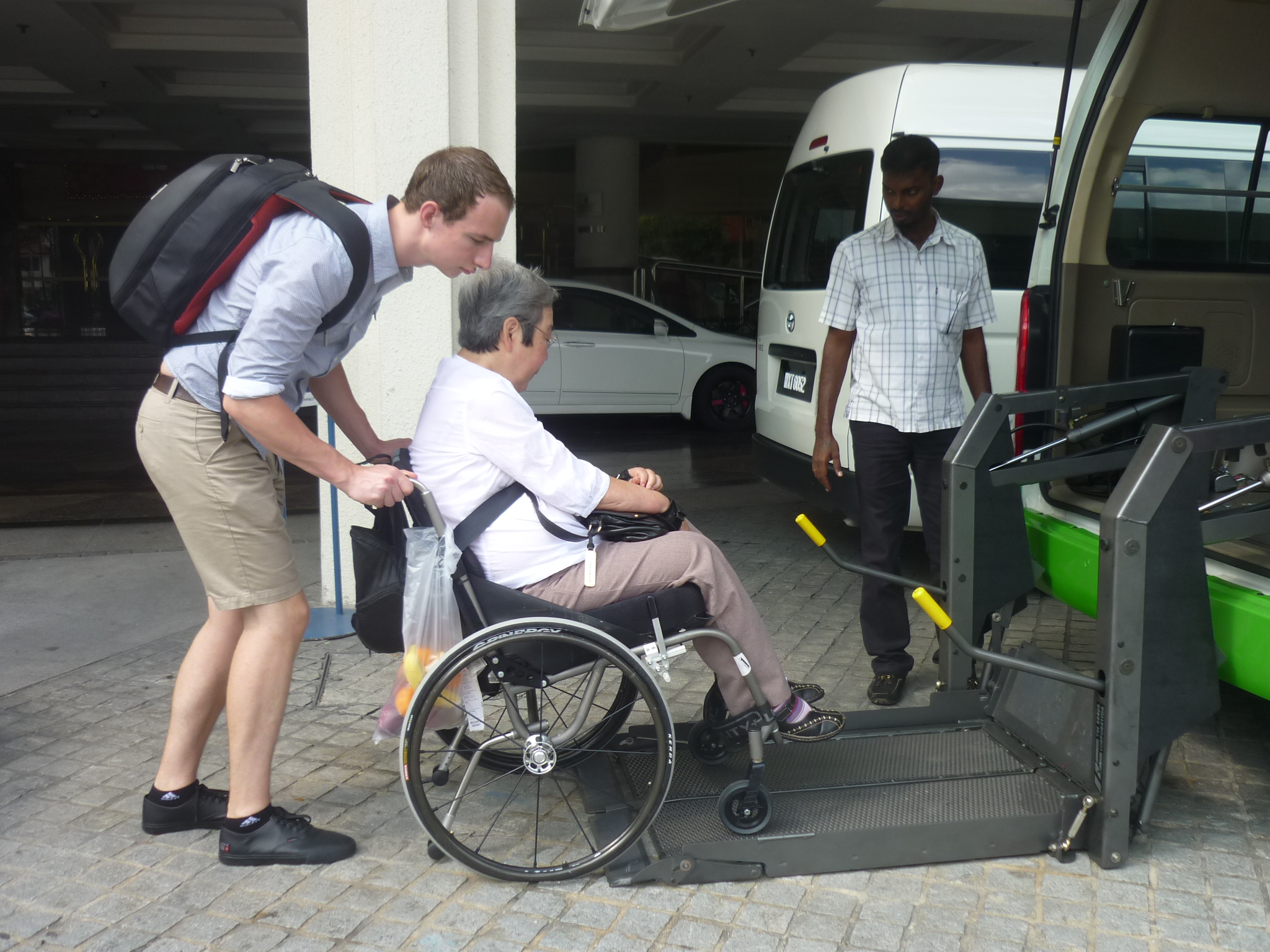Assisted travel for elderly individuals is gaining significant traction, addressing the growing need for accessible and safe travel options for seniors. This burgeoning sector offers a range of services tailored to the unique needs and preferences of older adults, encompassing everything from airport assistance and specialized transportation to fully escorted tours and independent travel support. Understanding the various aspects of assisted travel, from planning and booking to safety considerations and cost-effectiveness, is crucial for ensuring a positive and enriching travel experience for elderly travelers.
This guide delves into the intricacies of assisted travel for the elderly, providing a comprehensive overview of the services available, the logistical considerations involved, and the potential benefits for both the traveler and their families. We examine different types of assisted travel, accessibility features, safety protocols, and cost factors, ultimately aiming to empower seniors to explore the world with confidence and peace of mind.
Types of Assisted Travel for the Elderly
The travel industry is increasingly catering to the needs of senior citizens, recognizing the growing desire for exploration and adventure among this demographic. Assisted travel services offer a range of options, ensuring safe and comfortable journeys for elderly individuals with varying levels of mobility and support requirements. These services alleviate the stress often associated with travel for seniors and their families, allowing for a more enjoyable and enriching experience.
Categorization of Assisted Travel Services
The diverse needs of elderly travelers necessitate a variety of support services. The following table Artikels some key categories, descriptions, target audiences, and examples of provider types.
| Service Type | Description | Target Audience | Example Provider Type |
|---|---|---|---|
| Independent Travel Assistance | Provides support services like airport assistance, pre-booked transportation, and accessible accommodation arrangements. Travelers maintain their independence but receive help with logistical aspects. | Seniors with good mobility but requiring assistance with specific tasks or arrangements. | Travel agencies specializing in accessible travel |
| Fully Escorted Tours | Offers comprehensive support throughout the entire journey, including transportation, accommodation, guided excursions, and 24/7 assistance. Travelers are accompanied by a tour guide and support staff. | Seniors with limited mobility or requiring significant assistance throughout the trip. | Specialized tour operators for senior travelers |
| Cruise Line Services for Seniors | Many cruise lines offer adapted facilities and services tailored to elderly travelers, including accessible cabins, onboard medical facilities, and assistance with embarking and disembarking. | Seniors who enjoy cruising and prefer a self-paced, all-inclusive travel experience. | Major cruise lines with accessibility programs |
| Private Caregiver Travel | Individuals or families hire private caregivers to accompany the senior traveler, providing personalized assistance and support based on their specific needs. | Seniors requiring intensive medical or personal care during travel. | Private care agencies or independent caregivers |
Independent Travel Assistance versus Fully Escorted Tours
The primary difference between independent travel assistance and fully escorted tours lies in the level of support provided. Independent assistance focuses on facilitating the trip’s logistical aspects, allowing seniors to maintain their autonomy. Fully escorted tours, conversely, provide comprehensive support and guidance throughout the journey, ideal for those requiring constant assistance or preferring a more structured travel experience. For example, an individual with mild arthritis might benefit from independent assistance with pre-booked wheelchair access at airports, while someone with significant mobility limitations would likely require the comprehensive support of a fully escorted tour.
Transportation Options within Assisted Travel, Assisted travel for elderly
Various transportation options cater to the needs of elderly travelers. Airport assistance includes wheelchair services, assistance with baggage, and expedited security procedures. Specialized vehicles, such as wheelchair-accessible taxis or minibuses, ensure comfortable and safe transportation to and from destinations. Many assisted travel services also arrange private car transfers, offering a more personalized and convenient mode of transport. Furthermore, some services offer pre-booked train or cruise ship tickets with assistance provided at each transfer point.
For instance, a senior traveling alone might utilize airport wheelchair assistance and a pre-booked wheelchair-accessible taxi to their hotel. A group of seniors on a fully escorted tour might use a dedicated, accessible minibus for excursions.
Planning and Booking Assisted Travel for Seniors: Assisted Travel For Elderly
Planning a trip for an elderly loved one requires meticulous attention to detail, ensuring a safe, comfortable, and enjoyable experience. This involves careful consideration of their specific needs and preferences, as well as a thorough understanding of the available assisted travel options. The process, while potentially complex, can be streamlined with a systematic approach.
Remember to click active duty military vacation deals to understand more comprehensive aspects of the active duty military vacation deals topic.
Step-by-Step Guide to Booking Assisted Travel
Successfully booking assisted travel for seniors hinges on a well-defined process. Each stage requires careful planning and communication to minimize potential issues and maximize the trip’s enjoyment.
- Needs Assessment: Begin by thoroughly assessing the senior’s physical and cognitive abilities, medical conditions, and any mobility aids required (wheelchair, walker, oxygen tank). Note any dietary restrictions or allergies. This comprehensive understanding is crucial for selecting suitable travel arrangements.
- Destination Selection: Choose a destination appropriate for the senior’s capabilities. Consider accessibility features, climate, and potential health risks. For example, a cruise might be suitable for some, while a strenuous hiking trip would not be. A destination with good healthcare access is also vital.
- Travel Provider Research: Research specialized travel agencies or services catering to seniors with assisted travel needs. Compare services, pricing, and reviews. Look for providers with experience handling specific needs, such as wheelchair assistance or medical escort services.
- Booking and Communication: Clearly communicate the senior’s needs and requirements to the chosen provider, providing detailed medical information and any necessary documentation (e.g., doctor’s notes, prescriptions). Confirm all aspects of the booking, including transportation, accommodation, and any in-destination assistance.
- Pre-Trip Preparations: Ensure all necessary travel documents (passport, visa, insurance) are in order. Pack appropriately, considering the senior’s needs and the destination’s climate. Inform the provider of any changes to the senior’s condition before departure.
Questions to Ask Travel Providers
Effective communication with travel providers is essential for a successful trip. Asking the right questions ensures clarity and avoids misunderstandings.
- What specific assistance services do you offer for elderly travelers with mobility limitations?
- What is your experience handling medical emergencies during travel?
- What type of accommodation do you offer, and are they accessible for wheelchairs or other mobility aids?
- What is your cancellation policy, and what are the associated fees?
- What is included in the overall cost of the trip, and are there any hidden fees?
- What are your procedures for handling lost luggage or other travel disruptions?
- Do you have 24/7 emergency support available?
- Can you provide references or testimonials from previous clients with similar needs?
Communicating Specific Needs to Travel Providers
Clearly and comprehensively communicating the elderly traveler’s needs is paramount. This ensures the provider can make appropriate arrangements.Provide detailed information about the senior’s medical history, including any medications, allergies, and pre-existing conditions. Specify any mobility limitations and the type of assistance required (e.g., wheelchair assistance, assistance with boarding, etc.). Include contact information for the senior’s physician and any emergency contacts.
A detailed itinerary outlining the planned activities can help the provider assess the feasibility and safety of the trip. Finally, provide copies of any relevant medical documentation. The more information provided, the better the provider can cater to the individual’s needs.
Cost and Value of Assisted Travel Services

The cost of assisted travel for the elderly varies significantly, influenced by a complex interplay of factors. Understanding these price drivers is crucial for seniors and their families to make informed decisions and secure the best value for their investment. This section examines the cost structure of assisted travel packages and the substantial benefits that extend beyond the basic services provided.The price of an assisted travel package is determined by several key factors.
Trip length and destination significantly impact the overall cost. Longer trips and destinations requiring international flights will naturally be more expensive. The level of assistance required also plays a crucial role; packages offering extensive personal care, such as 24/7 medical support, will command a higher price than those with limited assistance. The type of accommodation chosen – from budget-friendly hotels to luxury resorts – also contributes to the final cost.
Finally, the inclusion of additional services, such as excursions or specialized dietary options, adds to the overall expense. For example, a week-long assisted trip to a nearby coastal town with basic assistance might cost around $2,000, while a three-week European tour with comprehensive medical care and premium accommodation could easily exceed $10,000.
Factors Influencing Price Variations in Assisted Travel
Several factors contribute to the price variability of assisted travel packages. These include the duration of the trip, the distance traveled, the level of personal care needed, the type of accommodation selected, and any additional services included. For instance, a shorter trip within the same country will typically be less expensive than a longer international journey. Similarly, a package that includes round-the-clock nursing care will be more costly than one with only basic assistance.
Choosing a luxury hotel over a budget-friendly option will also increase the overall cost.
The Value Proposition of Assisted Travel: Beyond Transportation and Accommodation
While transportation and accommodation form the core of any assisted travel package, the true value extends far beyond these basic elements. The peace of mind offered to both the senior traveler and their family is invaluable. Knowing that a trained professional is available to assist with mobility, medication management, or other personal needs provides significant reassurance. Moreover, assisted travel often includes access to specialized services tailored to the needs of older adults, such as accessible transportation, adapted accommodations, and culturally sensitive tour guides.
The social interaction and stimulation provided through group travel can also contribute significantly to the overall well-being of seniors, combating loneliness and promoting a sense of community. The benefits extend beyond the trip itself; memories created and the enhanced quality of life experienced often far outweigh the financial investment.
Finding Cost-Effective Assisted Travel Options
Securing cost-effective assisted travel doesn’t necessarily mean compromising on quality or safety. Careful planning and research are key. Consider traveling during the off-season or shoulder seasons to benefit from lower prices on flights and accommodations. Exploring smaller, lesser-known destinations can also offer a more affordable travel experience without sacrificing the enriching aspects of the journey. Booking well in advance can often unlock early-bird discounts and special offers.
Finally, comparing packages from multiple providers and carefully examining the inclusions and exclusions of each package can help identify the best value for money. For example, utilizing online comparison tools and contacting senior-focused travel agencies can provide access to a wider range of options and potentially uncover hidden discounts.
Technological Advancements in Assisted Travel

Technological innovations are revolutionizing assisted travel for seniors, enhancing accessibility, safety, and overall travel experience. From GPS tracking devices to AI-powered communication tools, these advancements are not only improving the ease of travel but also empowering older adults to maintain their independence and explore the world with greater confidence. This is leading to a shift in how assisted travel services are delivered and accessed, creating a more personalized and responsive travel landscape.Technological advancements are transforming the delivery and access of assisted travel services.
Real-time location tracking, for instance, provides peace of mind for both travelers and their caregivers. AI-powered chatbots offer immediate assistance with itinerary changes, booking modifications, and emergency situations, providing 24/7 support. Furthermore, virtual reality technology is increasingly used to provide immersive previews of destinations, helping seniors plan trips more effectively and reduce anxiety associated with unfamiliar environments.
This personalized approach ensures travel is tailored to individual needs and preferences, offering greater flexibility and control.
GPS Tracking and Personal Safety Devices
GPS tracking devices embedded in wearable technology, such as smartwatches or pendants, provide real-time location data, enabling caregivers and emergency services to quickly locate individuals if needed. These devices often incorporate fall detection sensors, automatically alerting designated contacts in case of an accident. Many models also feature two-way communication capabilities, allowing seniors to easily contact help with the push of a button.
The use of such technology significantly enhances the safety and security of elderly travelers, allowing for greater independence while mitigating risks associated with travel. For example, a senior traveling alone can activate a SOS signal if they feel unwell or lost, triggering immediate assistance.
AI-Powered Chatbots and Virtual Assistants
AI-powered chatbots and virtual assistants are becoming increasingly prevalent in the travel industry. These tools provide instant support for booking changes, itinerary adjustments, and general travel inquiries. They can also offer personalized recommendations, such as accessible restaurants or transportation options, based on individual needs and preferences. The 24/7 availability of these virtual assistants eliminates the need for constant phone calls and ensures timely assistance regardless of location or time zone.
For instance, a chatbot can seamlessly rebook a flight if a senior experiences a delay, minimizing disruption to their travel plans.
Mobile Apps and Online Tools Enhancing the Travel Experience
The increasing availability of user-friendly mobile applications and online tools specifically designed for assisted travel significantly enhances the travel experience for elderly individuals and their caregivers. These tools often integrate various functionalities, including itinerary management, accessibility information, translation services, and emergency contact lists. They also frequently incorporate features such as medication reminders and health tracking capabilities.
Examples of Mobile Apps and Online Tools
Several mobile apps and online platforms are designed to streamline and enhance the assisted travel experience. These applications often integrate various functionalities, offering comprehensive support for elderly travelers and their caregivers. For example, some apps provide real-time translation services, allowing seamless communication in foreign countries. Others offer curated lists of accessible accommodations, transportation options, and local attractions, catering to specific needs and preferences.
Some platforms even allow for the creation of personalized travel itineraries, factoring in accessibility requirements and individual preferences. This ensures a smoother, more enjoyable, and less stressful travel experience.
Ultimately, assisted travel for the elderly represents a vital service that enhances the quality of life for seniors by enabling them to continue exploring the world, fostering social connections, and promoting overall well-being. By understanding the various options available, planning meticulously, and prioritizing safety, elderly individuals can embark on fulfilling travel experiences that create lasting memories. The future of assisted travel promises further technological advancements and innovative solutions that will continue to improve accessibility, safety, and convenience for older travelers.


